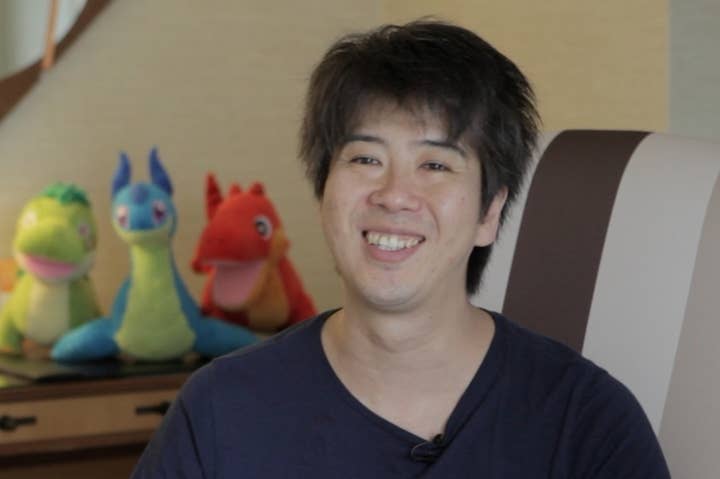Gree, DeNA aren't really gaming companies, says GungHo prez
The Puzzle & Dragons dev also thinks that a lot of success in the mobile space has been due to luck
GungHo Online Entertainment is having a great year. The company may not be as well known as some others in the mobile space, like Gree or DeNA, but thanks to the enormous success of Puzzle & Dragons, GungHo is easily worth more than those two with a market cap of about $9 billion. Interestingly, GungHo president Kazuki Morishita prefers to think that much of his company's success comes down to luck.
"If everyone focused on sales and they came up with a solution, then every company would make money. We really think that, in terms of sales, it has to do a lot with luck and we believe that as long as we focus on the creative side and make sure that the game is fun, at least among us, that's something that will transition to sales as well sooner or later," he told GamesIndustry International.
Puzzle & Dragons has reportedly been bringing in revenues as high as $2 million daily, and while having a hugely popular IP is helpful, at some point it's necessary to create other top-selling titles if GungHo is to stay competitive with Gree, DeNA and others. Morishita, however, isn't concerned the least bit about his Japanese rivals - in fact, he told us that he doesn't even consider them rivals.
"In terms of Gree and DeNA, we believe that they're more like IT companies... so we don't think they are necessarily the same as gaming companies"
"In terms of Gree and DeNA, we believe that they're more like IT companies. They're tech companies, so we don't think they are necessarily the same as gaming companies. We don't think they're our true rivals in the game market," he said. "We'd really like to work against and work with different creative studios, gaming studios. In that sense, we don't really think our strategy has anything to do with working against DeNA or Gree."
Morishita proceeded to circle back to the idea that luck, not strategy, guides GungHo's fortunes. "At the end of the day...it was luck. Once the game releases and it becomes a big, huge success, many companies actually comment, saying, 'Oh, this was because of this.' They're able to add on reasoning later on. That's very easy to do, but during the creative development phase, you're not really thinking about stuff like that. What you're actually doing is trying to create a good game at pretty much the basics of what you think is good and what you think other people will think is good," he said.
"Creating that game is pretty much our strategy. As long as you're actually trying to make good games, then sales will follow afterwards. If it doesn't, too bad, but at least we made a great game. If it does well, we made a great game and it was lucky. That's why it's doing so well. That's pretty much how we think."

Morishita also takes a lot of pride in the Japanese development scene. There have been a number of Japanese developers who have been critical of Japanese output in recent years, especially former Capcom executive Keiji Inafune, but Morishita simply views the criticisms as a sign of passion and an indicator that Japan truly matters to the game industry on a global scale still.
"Regarding Inafune's comments, we take it as more of a push of the Japanese developers. We need to work harder to create better games. We definitely think it's a positive comment. In terms of the negativity among Japanese developers and their creatives, we believe that we probably need to go back to basics, to remember why we actually started working in games in the first place and enjoy doing creative work. Going back to basics is probably the one thing we need to work on in terms of Japanese development," he said.
"In terms of having negative comments overall, we believe that there are pretty much two countries that get negative comments about development prowess, and I believe that's the United States and Japan. We also believe that because we get negative comments, it probably means that we are very vital in the video game market, and those two development powers, those are the two pillars of video games. We think that that's sort of a compliment in a way. And definitely we will keep working harder."
"Going back to basics is probably the one thing we need to work on in terms of Japanese development"
Morishita keeps himself incredibly busy. Even while traveling in America he acknowledged that he couldn't get his mind off the 13-14 titles that he's currently overseeing. And now with Suda51 and Grasshopper in the fold for GungHo, there will be even more projects. Morishita loves having the diversity of content under his umbrella. For someone who's had such success lately, it's fascinating to hear him completely brush aside the business aspects. "The main thing that I enjoy doing is just creating games. I really don't care for the whole business aspect of the industry," he said.
Ironic, then, that he proceeded to tell us that cash generation will be GungHo's biggest ongoing challenge. "One of the hurdles is figuring out cash. If you want to make good games, you need cash. Do you know how much you need to make a good game? Not really. The more cash you've got, the better," he said.
As for the Soft Bank investment, Morishita clarified that it did not lead to any further cash for GungHo. Many had reported the news as an acquisition, but Soft Bank already owned around 30 percent of GungHo stock and it just got raised to 40 percent, "so we didn't really receive any funding," Morishita said. "It wasn't really like they were new investors coming on and taking a chunk. So nothing's really changed... It's sort of misunderstood information that went out in the press."
In a separate email, a GungHo spokesperson further explained, "It's a misunderstanding that Softbank purchased shares from GungHo to increase their stake. Softbank Mobile, an affiliate company of Softbank, acquired 6.37 percent (73,400 shares) of GungHo's stocks from Asian Groove (the 3rd largest stockholder of GungHo with Son Taizo--Chairman of GungHo--as their senior partner) through a tender offer (which lasted until 4/26). The recent increase in Softbank's stake was a merely a result of Softbank Mobile (the 4th largest shareholder after this transfer) and Asian Groove transferring stocks between themselves, so the Softbank group did not pay money or purchase stocks directly from GungHo.”









